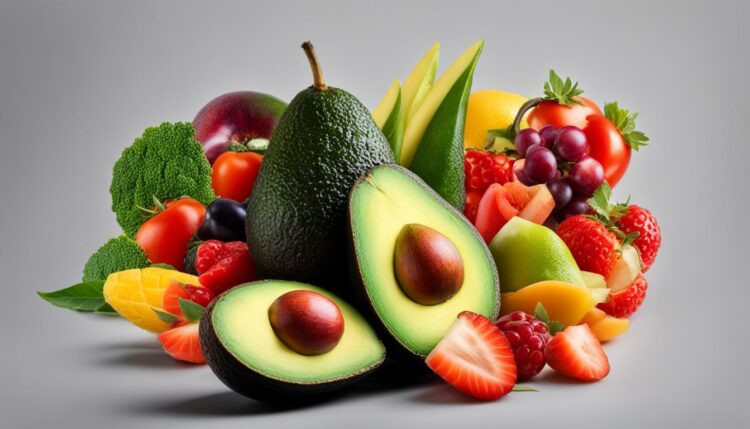Testosterone is a vital hormone that plays a crucial role in various aspects of health, including sex drive, bone and muscle health, sperm production, and blood cell production.
As we age, testosterone levels tend to decline. However, there are natural remedies and lifestyle changes that can help maintain optimal testosterone levels.
One such natural remedy is avocado, a nutrient-rich superfood that has been associated with promoting hormonal balance and potentially boosting testosterone production.
While there’s limited research specifically focused on the impact of avocado on testosterone, it is known to be a healthy addition to a balanced diet due to its rich nutrient content.
Avocados are packed with essential nutrients like vitamin D, magnesium, zinc, and boron, all of which are important for maintaining healthy testosterone levels. These nutrients play a role in testosterone synthesis and regulation, supporting overall hormonal health.
Key Takeaways:
- Avocado is a nutrient-rich superfood that may have potential benefits for maintaining healthy testosterone levels.
- Avocado is rich in essential nutrients such as vitamin D, magnesium, zinc, and boron, which are important for hormonal balance.
- Incorporating avocado into a balanced diet can support overall hormonal health and potentially boost testosterone production.
- While more research is needed on avocado’s direct impact on testosterone, it is a healthy addition to a health-promoting lifestyle.
- Consult with a healthcare professional for personalized recommendations to support hormone health.
The Role of Testosterone and Factors Affecting Levels
Testosterone is a vital hormone that plays a crucial role in various aspects of health, including sex drive, bone and muscle health, sperm production, and blood cell production.
As men age, testosterone levels naturally decline. However, there are other factors that can contribute to low testosterone levels, including certain medications, high body fat levels, and underlying health conditions.
Making lifestyle changes is one way to help increase testosterone levels naturally. Adopting a nutritious diet can have a significant impact on testosterone levels.
Certain foods have been associated with potential benefits for testosterone levels, including fish, leafy greens, eggs, and cocoa products. However, it’s important to note that the impact of these specific foods on testosterone levels is an area of limited research.
“Testosterone is a vital hormone that affects several aspects of health, including sex drive, bone and muscle health, sperm production, and blood cell production.”
When it comes to medications, certain drugs can lower testosterone levels. These may include corticosteroids, opioids, and some medications used to treat prostate cancer.
If you’re concerned about your testosterone levels, it’s important to speak with your healthcare provider about any medications you’re taking and their potential impact on hormone levels.
Incorporating certain foods into your diet can potentially support healthy testosterone levels. Here are some examples:
- Fish: Fatty fish, such as salmon and mackerel, are rich in omega-3 fatty acids, which have been associated with potential benefits for testosterone levels.
- Leafy Greens: Vegetables like spinach and kale are packed with nutrients, including magnesium, which is important for testosterone synthesis.
- Eggs: Eggs are a good source of protein and contain nutrients like vitamin D and zinc, which are beneficial for testosterone production.
- Cocoa Products: Dark chocolate and cocoa powder contain flavonoids that may have potential benefits for testosterone levels.
While these foods have been associated with potential benefits for testosterone levels, it’s important to remember that maintaining a healthy lifestyle, including regular exercise and managing stress levels, is crucial for overall hormone health.
Additionally, it’s always best to consult with a healthcare professional before making any significant changes to your diet or lifestyle.
| Contributing Factors to Low Testosterone Levels | Impact on Testosterone Levels |
|---|---|
| Age | Natural decline |
| Medications | May lower testosterone levels |
| High body fat levels | Potential decrease in testosterone levels |
| Underlying health conditions | May contribute to low testosterone levels |
Fatty Fish and Testosterone Levels
Fatty fish, such as salmon and sardines, are a valuable addition to your diet if you’re looking to support healthy testosterone levels. These fish are rich in nutrients that play a crucial role in hormonal health, including:
- Vitamin D: Essential for proper testosterone production and function.
- Zinc: Plays a role in testosterone synthesis.
- Omega-3 fatty acids: Help reduce inflammation and support overall hormonal balance.
While some studies suggest that low-fat diets may be associated with decreased testosterone levels compared to higher fat dietary patterns, it’s important to note that the relationship between dietary fat and testosterone is still not fully understood. However, including fatty fish in your diet can provide a range of other health benefits and essential nutrients that support overall well-being.
Here are some reasons why fatty fish should be a part of your nutrient-dense foods:
- Rich in Vitamin D: Vitamin D is critical for testosterone production and function. Fatty fish, like salmon and sardines, are excellent natural sources of this essential vitamin.
- Abundant in Zinc: Zinc is a mineral that supports testosterone synthesis. Incorporating fatty fish into your meals can help ensure you’re getting enough zinc for healthy hormonal function.
- Source of Omega-3 Fatty Acids: Omega-3 fatty acids help reduce inflammation and promote hormonal balance. Consuming fatty fish regularly can help optimize your omega-3 intake and support overall hormonal health.

Dark, Leafy Greens and Testosterone Levels
Dark, leafy greens such as spinach, kale, and collard greens are excellent sources of micronutrients, including magnesium. Magnesium is critical for maintaining optimal testosterone levels, especially in older men.
It is thought to increase testosterone bioactivity by reducing oxidative stress, which can impact testosterone production. Studies have shown that men with higher magnesium levels have higher testosterone levels.
Additionally, low intake of leafy green vegetables has been linked to lower testosterone. Therefore, incorporating dark, leafy greens into your diet can provide magnesium and other nutrients that may support healthy testosterone levels.
Leafy greens like spinach, kale, and collard greens are packed with essential vitamins and minerals that contribute to overall health. One key nutrient found in these greens is magnesium.
Magnesium plays a crucial role in testosterone production and maintaining hormone balance. It has been shown to enhance testosterone bioactivity by reducing oxidative stress, a factor that can negatively affect testosterone levels.
A study published in the Journal of Clinical Endocrinology and Metabolism found that men with higher magnesium levels had higher testosterone levels.
Low intake of magnesium-rich foods, including dark, leafy greens, has been associated with decreased testosterone levels. Incorporating spinach, kale, and collard greens into your diet can provide a natural source of magnesium and support optimal testosterone levels.
Furthermore, dark, leafy greens offer a variety of other health benefits. They are rich in vitamins A, C, and K, which have antioxidant properties and contribute to overall well-being. These greens also provide fiber, which aids in digestion and helps maintain a healthy weight.
Here are some ways you can incorporate dark, leafy greens into your diet:
- Add them to salads for a nutritious and satisfying meal.
- Sauté them with garlic and olive oil for a flavorful side dish.
- Blend them into smoothies for a boost of vitamins and minerals.
- Use them as a base for wraps or sandwiches instead of traditional bread.
By including dark, leafy greens in your diet, you can reap the many benefits they offer, including supporting healthy testosterone levels.
Cocoa Products and Testosterone Levels
Cocoa products, such as cocoa powder and cacao nibs, have gained attention for their potential benefits on testosterone levels. These delicious treats contain essential nutrients, including magnesium and flavonoid antioxidants, that may contribute to hormonal health.
Flavonoids, a type of antioxidant found in cocoa, have been linked to increased testosterone production from Leydig cells. Leydig cells play a crucial role in testosterone synthesis, making this a significant finding.
Certain flavonoids, such as quercetin and apigenin, have been studied for their potential to enhance testosterone production.
It is important, however, to choose cocoa products without added sugars or with minimal amounts of added sugar. Excessive sugar consumption can have detrimental effects on overall health and may counteract the potential benefits of cocoa on testosterone levels.
To fully understand the impact of cocoa products on testosterone levels, further research is needed. Nevertheless, the rich presence of magnesium and flavonoid antioxidants in cocoa makes it an appealing addition to a balanced diet aimed at supporting hormonal health.
| Cocoa Product | Magnesium Content | Flavonoid Antioxidants |
|---|---|---|
| Cocoa Powder | 4.9 mg per tablespoon | High levels |
| Cacao Nibs | 27.0 mg per ounce | Rich source |
The Benefits of Magnesium
Magnesium is an essential mineral that plays a crucial role in various bodily functions, including testosterone synthesis. It is involved in over 300 enzymatic reactions and has been linked to maintaining healthy testosterone levels.
While the exact mechanisms are not fully understood, magnesium’s ability to support Leydig cell function and reduce inflammation may contribute to its positive impact on testosterone production.
The Power of Flavonoid Antioxidants
Flavonoid antioxidants in cocoa products offer multiple health benefits, including potential support for testosterone levels.
These antioxidants protect cells from oxidative stress and inflammation, both of which can negatively affect testosterone production. By reducing oxidative stress and inflammation, flavonoids may help optimize hormonal balance.

“The inclusion of cocoa products in a balanced diet may provide nutrients that support hormone health, including potential benefits for testosterone levels. However, further research is needed to fully understand the specific mechanisms and effects.”
Avocados and Testosterone Levels
Avocados are a nutrient-rich fruit that offers several potential benefits for testosterone levels. They provide healthy fats, including monounsaturated and polyunsaturated fats, which are important for hormonal health.
Avocados also contain nutrients like boron, zinc, and vitamin B, which have been associated with testosterone synthesis and regulation.
While studies on avocado’s direct impact on testosterone levels are limited, incorporating avocados into a balanced diet can contribute to maintaining healthy testosterone levels.
| Nutrient | Avocado Content per 100g | Function |
|---|---|---|
| Healthy Fat | 14.7g | Supports hormone production and overall hormonal health. |
| Boron | 0.1mg | Associated with testosterone synthesis and regulation. |
| Zinc | 0.6mg | Important for testosterone production and hormonal balance. |
| Vitamin B | 0.1mg | Plays a role in testosterone synthesis and hormone regulation. |
Incorporating avocados into a balanced diet can provide a variety of beneficial nutrients that support hormonal health and potentially contribute to maintaining healthy testosterone levels.
To further enhance your diet’s impact on testosterone levels, consider incorporating other testosterone-boosting foods such as eggs, which are rich in selenium and protein, and berries, cherries, and pomegranates, which contain flavonoid antioxidants that may support testosterone production.
Other Testosterone-Boosting Foods
In addition to avocados, there are other foods that may have potential benefits for testosterone levels. By incorporating these testosterone-boosting foods into your diet, you can provide your body with essential nutrients that support hormonal health.
Eggs
Eggs are a good source of protein and selenium. Protein is crucial for testosterone production, as it provides the building blocks necessary for hormone synthesis. Selenium, on the other hand, is an essential mineral that plays a role in testosterone metabolism and supports overall reproductive health.
Berries, Cherries, and Pomegranates
Berries, cherries, and pomegranates are rich in flavonoid antioxidants, which have been associated with increased testosterone production. Flavonoids protect testosterone-producing cells from oxidative stress and may enhance testosterone bioactivity. Adding these colorful fruits to your diet can offer potential benefits for hormonal balance and testosterone levels.
Shellfish
Shellfish, such as oysters and clams, are highly nutritious foods that can support testosterone production. They are rich in zinc, selenium, and omega-3 fatty acids. Zinc is crucial for testosterone synthesis and supports the health of the prostate gland.
Selenium supports healthy sperm development and testosterone metabolism. Omega-3 fatty acids contribute to overall hormonal health and can help reduce inflammation in the body.
By including these testosterone-boosting foods in your diet, you can provide your body with the nutrients it needs to support optimal testosterone levels and overall hormonal health.
Conclusion
Avocado, a nutrient-rich superfood, shows promising potential in maintaining healthy testosterone levels and supporting hormonal balance.
While direct research on avocado’s impact on testosterone is limited, its rich composition of essential nutrients such as vitamin D, magnesium, zinc, and boron make it an ideal addition to a testosterone-boosting diet. These nutrients are vital for testosterone production and overall hormonal health.
Incorporating avocado into a health-promoting lifestyle, along with other testosterone-boosting foods and making necessary lifestyle changes, can contribute to maintaining optimal testosterone levels.
However, it is crucial to note that a balanced diet should be followed, and consulting with a healthcare professional for personalized recommendations is always recommended to support hormone health and well-being.
By adopting a holistic approach that includes nutrient-rich superfoods like avocado and making lifestyle adjustments, individuals can take control of their testosterone levels and strive towards achieving hormonal balance.
Focus on nourishing your body with the right foods and prioritizing a healthy lifestyle to support testosterone production and overall hormonal health.
FAQ
Can avocado boost testosterone levels?
While there is limited research specifically focused on avocado’s impact on testosterone levels, avocado is a nutrient-rich superfood that provides essential nutrients like vitamin D, magnesium, zinc, and boron, which are important for hormonal balance and potentially testosterone production.
Incorporating avocado into a balanced diet can contribute to maintaining healthy testosterone levels.
What are the effects of low testosterone levels?
Low testosterone levels can have various effects on health, including decreased sex drive, loss of muscle mass, decreased bone density, fatigue, mood changes, and reduced sperm production. It is important to maintain optimal testosterone levels for overall health and wellbeing.
Are there other lifestyle changes that can help increase testosterone levels?
Yes, lifestyle changes can contribute to maintaining healthy testosterone levels. These include regular exercise, managing stress levels, getting enough sleep, maintaining a healthy weight, and avoiding excessive alcohol consumption.
What other foods are beneficial for testosterone levels?
Other foods that may have potential benefits for testosterone levels include fatty fish (such as salmon and sardines), leafy greens (like spinach and kale), eggs, cocoa products (such as cocoa powder and cacao nibs), berries, cherries, pomegranates, and shellfish (including oysters and clams).
These foods provide various nutrients that support hormonal health and overall wellbeing.
How can I incorporate avocados into my diet?
Avocados can be enjoyed in many ways, such as adding them to salads, sandwiches, smoothies, or using them as a spread or topping. They can also be used to make guacamole or as a healthy fat source in cooking and baking recipes.
Is avocado suitable for everyone?
Avocado is generally safe for most people to consume as part of a healthy diet. However, individuals with specific allergies or medical conditions should consult with their healthcare provider before adding avocado to their diet.
Can avocado help with hormonal balance?
Avocado is a nutrient-rich superfood that provides healthy fats and essential nutrients like boron, zinc, and vitamin B, which have been associated with hormone synthesis and regulation.
While the direct impact of avocado on hormonal balance is still an area of limited research, incorporating avocados into a balanced diet can contribute to overall hormonal health.
How much avocado should I consume to support testosterone levels?
There is no specific recommended daily intake of avocado for supporting testosterone levels. It is recommended to include avocado as part of a balanced diet that includes a variety of other testosterone-boosting foods and lifestyle changes to support overall hormonal health.




